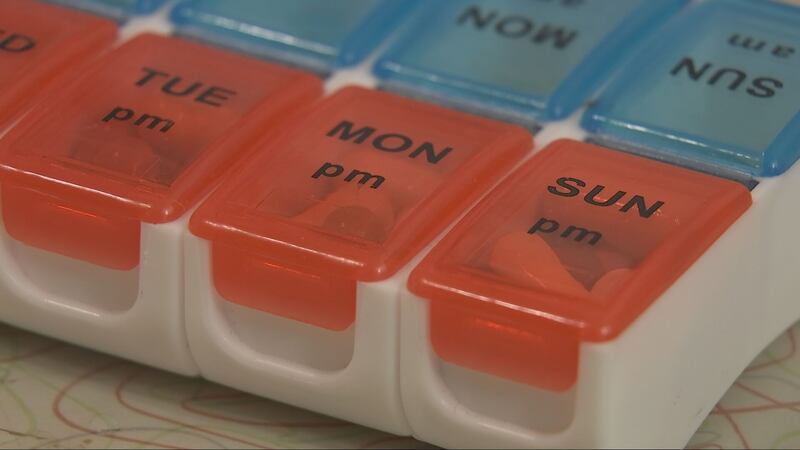COVINGTON, Wash. — Bill Burkard is so mad he says he wants to choke someone. He’s kidding. A little.
When we met him at his home in Covington, he was dealing with yet another message from yet another pharmacy telling him they did not have his type two diabetes drug in stock. He was diagnosed almost two decades ago. But his struggles got more serious just months ago -- at about the same time Oprah started really shedding weight. She looks amazing. Bill doesn’t care. “Don’t get me started,” he says, in a bad mood that he partially blames on his erratic blood sugar.
Bill’s on a lot of meds for his diabetes and high blood pressure. Anyone who knows someone with diabetes knows that it’s a long, uneven road: tripping and stumbling as they try to find the right medication and the right dosages to get their levels in check. Ozempic was the answer for Bill. Unfortunately for him, it’s also the answer for so many people trying to lose weight-- some for medical reasons, others for vanity.
Novo Nordisk’s Ozempic was approved for diabetes treatment seven years ago, but the shortage crisis really began last year and has ramped up ever since. It has semaglutide and is in a class of medications known as GLP-1. Semaglutide is also proven to help with weight loss, and Novo Nordisk makes a weight loss version called Wegovy. And therein lies the problem.
There is a worldwide shortage of semaglutide. Knowing that diabetics have long needed GLP-1 drugs, Novo Nordisk dedicates more for its Ozempic drug (for diabetes) than its Wegovy (for weight loss). But as Oprah and many other celebrities have admitted to using GLP-1 type drugs for weight loss, the demand has shot up, and people are getting prescriptions for Ozempic even if they don’t have diabetes.
Healthcare analytics firm Trilliant Health recently reviewed prescribing rates in 50 major cities and determined that 42 percent of people taking Ozempic had no history of diabetes. Trilliant also found how popular it’s become in the Seattle area: there was a 351% increase in people taking Ozempic in the first year semaglutides were approved for weight loss.
Washington Poison Control has also seen a sharp increase in the number of calls they’ve received about people having adverse reactions to GLP-1 drugs. Executive Director Dr. Scott Phillips says the problems tend to be minor, including nausea, pain in the belly, vomiting, diarrhea or constipation. “It’s jumped from a few cases a year to dozens and dozens of cases a year,” he says, “So, it’s definitely picking up, and we’re having at least one in a week or more.”
He says much of that may be because people are turning to compound pharmacies, which do not have premeasured syringes, and people may be getting their dosage wrong. Also, if patients do manage to get Ozempic for weight loss, the dosage is different than it might be for Wegovy.
Meanwhile, Bill Burkard is having a tough time finding any medication at all. Most people who buy GLP-1 drugs for weight loss have to pay out of pocket. It can run more than one thousand dollars a month, but if they can afford it, they can buy it on the spot. For diabetics like Bill, insurance will only cover a couple of months at a time. That means, when he has two weeks left of meds, he must start the search all over again. Often, they might have a different GLP-1 drug than Ozempic, which means a whole different headache. “And so, I talked to the Walgreens yesterday,” Bill tells us from his couch. " They told me to call the doctor. He said, ‘No, they need to use this prescription.’ So, I called them back and they said, ‘Oh, well, okay. Well, it might be a little bit because of the insurance.’ So, I called the insurance and they said, ‘Oh no, we just approved it.’ So, then I called Walgreens back and then they said, ‘Yeah. We’re out.’”
When KIRO 7 asked Novo Nordisk about the shortage and the problems diabetics face getting semaglutide medication, they responded, “In the U.S., we cannot control which specific pharmacies or patients receive Ozempic® as we distribute our products to wholesalers who in turn supply retail pharmacies nationwide. While we respect every healthcare professional’s clinical expertise and their right to prescribe treatment based on their own medical judgment, we ask that healthcare professionals prescribe our medicines consistent with their FDA-approved indications. Novo Nordisk is committed to the responsible use of our medicines. We are taking multiple steps to ensure responsible use of our semaglutide medicines which are detailed on semaglutide.com.
“Keeping our patients’ needs first, we are expanding our production, which already runs 24 hours a day, seven days a week. We continue to build and invest in new manufacturing capacity. In 2024, we will - once again - significantly step up our investments in production. We plan to invest approximately $6.5 billion in production, compared to investments of approximately $3.6 billion last year.”
Will that be enough for Bill? He doesn’t know. His mother had diabetes and died before she reached the age he is now.
He understands that being overweight can be a health risk for a lot of people. But he also knows he’s beyond a health “risk” -- his diabetes is a health reality. And he has a message for people who are taking a semaglutide for vanity weight loss.
“You’re stealing from the people that need the drug to live. To live? My doctor told me we’re going to cut your feet off if you don’t get your sugar in control. We’re cutting your feet off. And she pulls my socks off, scrapes my feet, and puts needles in them to make sure I can feel. It’s a real thing.”
©2024 Cox Media Group








